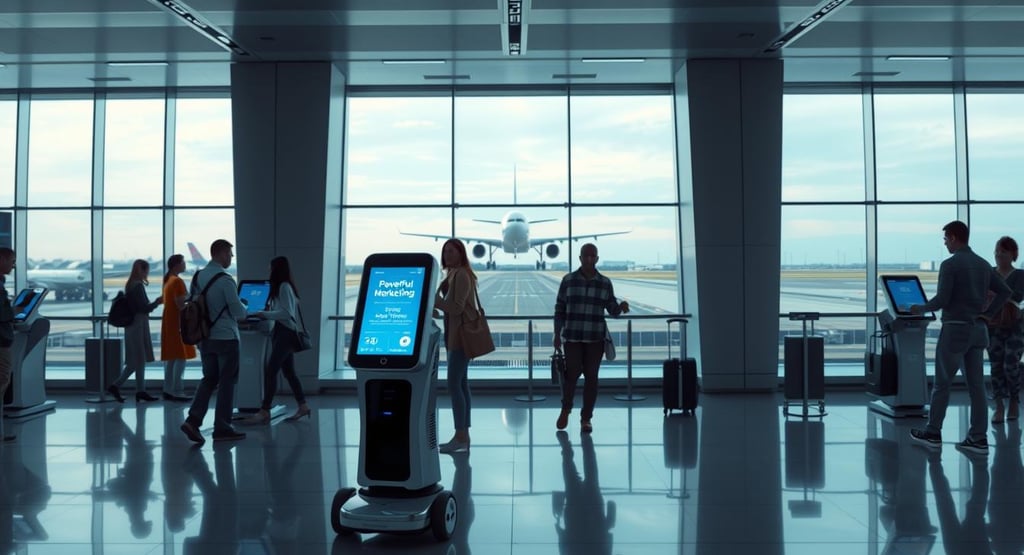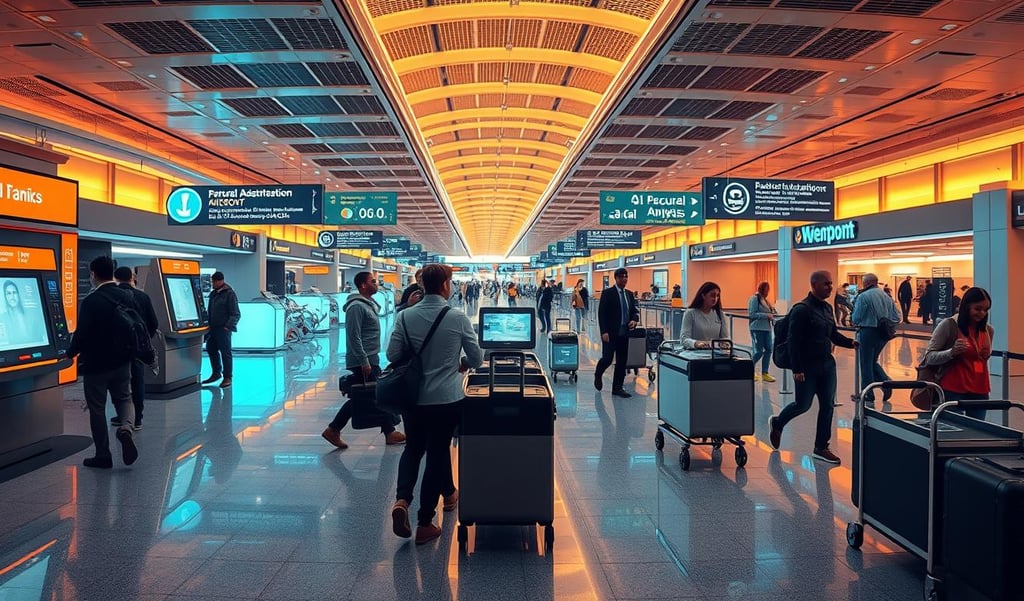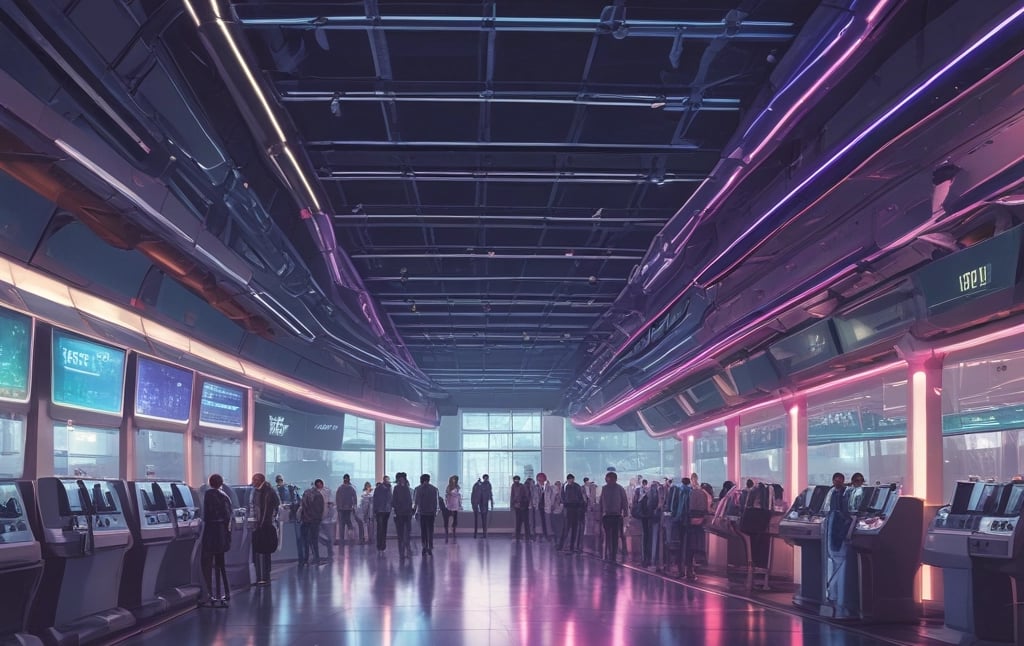AI in Travel Improves Customer Experience Through Tech
Discover how Ai in travel can revolutionise your customer experience. Get affordable AI marketing solutions tailored for travel companies.
TRAVEL MARKETING
Powerful Digital Marketing
10/6/202510 min read


You are living through a remarkable moment. Technology is completely reshaping how you plan, book, and experience your journeys. From jet engines to online booking platforms, each leap leaves its mark. Now, artificial intelligence leads the charge as the latest game-changer.
This technology solves real problems you face. Think about flight delays or last-minute cancellations. AI provides instant, intelligent support right when you need it most. It transforms a potentially stressful ordeal into a smooth, enjoyable experience.
The numbers tell an exciting story. A recent Oliver Wyman survey found over 40% of North American leisure travellers used generative AI tools for planning. That figure jumped significantly in just six months. Millions are embracing this advancement.
What makes it special is its ability to deliver on promises. It offers seamless service and personalised attention consistently. This democratises luxury experiences once reserved for high-paying customers.
As you explore this guide, you will discover how companies leverage affordable marketing solutions. They can enhance your experience without breaking their budgets.
The Evolution of Technology in Travel
The way we explore our world has been transformed by a series of remarkable innovations. Each breakthrough builds upon the last, creating a clear progression that enhances your journey experiences.
Historic Technological Milestones
Consider the 1950s jet engine revolution. It slashed international journey times from days to hours. This fundamentally changed how people thought about global exploration.
The 1990s dot-com boom brought another seismic shift. Suddenly, you could plan entire holidays from your computer. No more visiting agencies or relying on brochures.
From Jet Engines to AI Innovations
Today's artificial intelligence represents the latest chapter. Unlike previous tools that required your research effort, this technology learns your preferences. It actively assists rather than just providing information.
This evolution makes journeys more accessible and efficient for everyone. The travel industry continues its remarkable transformation, always aiming to improve your experience.


How Ai in travel is Revolutionising Customer Experiences
The modern journey experience is undergoing a quiet revolution that puts your personal needs at the forefront. Instead of generic suggestions, you now receive tailored recommendations that truly match your interests.
These systems analyse your past booking history and browsing patterns to understand your unique preferences. They learn what you enjoy and suggest destinations, hotels, and activities that feel personally curated.
Personalised Recommendations and Seamless Journeys
Imagine arriving in a new city and immediately receiving spot-on suggestions for your exact tastes. Whether you love food, history, or adventure, intelligent platforms eliminate hours of research.
The convenience factor is massive. Instead of comparing endless options, the technology handles the heavy lifting. You can focus on the excitement of your upcoming adventure.
These platforms don't just make static recommendations, they adapt in real-time. If your flight is delayed or a restaurant is fully booked, they suggest smart alternatives instantly.
For many travelers who feel overwhelmed by choices, this acts as an intelligent filter. It cuts through the noise and presents curated options that make sense for your situation.
The seamless journey aspect means assistance works quietly throughout your entire trip. From initial booking to your return home, it anticipates issues and smooths rough spots before they become problems.
Affordable AI Marketing Solutions for Travel Companies
Many travel business owners mistakenly believe that cutting-edge marketing technology is out of reach for smaller operations. The assumption that sophisticated solutions require massive budgets and extensive technical teams no longer holds true.
Today, affordable options exist specifically designed for the travel industry. These tools understand the unique challenges your company faces, seasonal demand fluctuations and complex customer journeys.
What makes these solutions particularly valuable is their ability to automate time-consuming tasks. They handle customer segmentation, personalised email campaigns, and social media content creation. This frees your team to focus on delivering exceptional experiences.
You don't need to be a tech expert to leverage these marketing tools. They feature intuitive interfaces and pre-built templates for promoting destinations and packages. The affordability aspect levels the playing field against larger competitors.
With limited resource requirements, you can implement these solutions without disrupting operations. They gradually integrate intelligent automation that improves customer acquisition and retention metrics.
Key AI Applications in the Travel Industry
Smart technology applications are delivering tangible benefits for your trip planning right now. These tools analyse your preferences to suggest perfect destinations and activities. They make the entire process smoother and more personalised.


The most valuable features help you manage costs and create ideal schedules. They work behind the scenes to ensure you get the best experience possible.
Predictive Pricing Models
Predictive systems examine massive amounts of historical and real-time information. They forecast when flight and hotel costs will rise or fall. This helps you book at the optimal moment for savings.
Instead of constantly checking rates yourself, these tools monitor fluctuations automatically. They send alerts when prices are expected to increase. This gives you confidence you're securing the best deal available.
Dynamic pricing works both ways, companies adjust rates based on demand while you benefit from tools that navigate these changes. The data powering these applications is truly impressive in scale.
Dynamic Itinerary Planning
Dynamic itinerary creation takes personalisation to another level. It generates complete plans based on your preferences, budget, and past trips. The system even considers your preferred pace—whether you like busy days or relaxed exploration.
These generated schedules aren't rigid. They adapt in real-time based on weather, crowd levels, or your feedback during the journey. This ensures your plans remain optimal throughout your experience.
The planning intelligence considers factors you might overlook. It suggests visiting attractions on less crowded days or recommends restaurants matching your dietary needs. This creates a seamless, personalised adventure.
Enhancing Trip Planning with Predictive Analytics
What if you could see potential disruptions before they even happen? Predictive analytics transforms your trip planning from reactive guesswork to strategic foresight. This technology analyses massive amounts of historical data to forecast everything from weather delays to seasonal overcrowding.
For business travellers with tight schedules, this is invaluable. The system identifies optimal travel times that minimise delays and suggests backup plans for critical meetings. It even predicts which airports or routes prove most reliable during specific seasons.
The advantages extend perfectly to leisure planning too. By analysing booking trends and demand patterns, predictive tools tell you when destinations will be crowded versus when you'll find better prices. This helps you time your trip planning perfectly.
These systems don't just look at logistics, they analyse broader trends like emerging destination popularity. They consider global events that might impact your plans, from festivals that enhance your experience to situations you'd want to avoid.
The technology gets smarter over time, learning from millions of travelers' experiences. Your suggestions become based on robust data patterns rather than guesswork. This creates smoother travel experiences for everyone involved.
Utilising AI Tools for Customer Support
When you're facing a travel emergency, immediate assistance can make all the difference. Modern support systems provide instant help exactly when you need it most. They eliminate frustrating wait times and language barriers that once complicated international journeys.
Chatbots for Real-Time Assistance
Today's chatbots have evolved beyond basic automated systems. They understand context and nuance, providing genuinely helpful responses to your questions. These tools offer 24/7 support without requiring you to wait on hold.
Imagine being stuck at an airport with a cancelled flight at 2 AM. A chatbot instantly provides alternative options and rebooking assistance. It can even suggest hotel recommendations if you need to stay overnight.
The global chatbot market's projected growth to $15.5 billion by 2028 reflects their value. Language barriers are largely eliminated as they communicate seamlessly in dozens of languages. This ensures you get support in your preferred language anywhere in the world.
Voice-Based Digital Assistance
Voice-based assistance takes convenience to another level. You can manage your travel needs hands-free using simple voice commands. This proves incredibly useful when navigating unfamiliar cities or multitasking.
Simply say "find me a highly-rated Italian restaurant within walking distance" and receive personalised recommendations. The assistant considers your dietary preferences, budget, and current location. It can even book reservations with another voice command.
These tools learn from every interaction, creating increasingly personalised support over time. They remember your previous issues and anticipate your needs. This creates a smoother, more efficient experience for every journey.
Integrating Facial Recognition and Advanced Security Measures
Your airport experience is getting a major security and convenience upgrade. Facial recognition technology is transforming tedious security checks into seamless journeys. Instead of fumbling for documents, cameras verify your identity as you move through checkpoints.
Major hubs like Dubai International and New York's JFK use these systems for more than convenience. They compare live images against databases in milliseconds, instantly identifying potential security concerns. This recognition capability significantly enhances protection for all travelers.
The benefits extend beyond identity verification. AI-powered systems silently scan luggage for suspicious items. They analyse crowd patterns to detect unusual behaviour and prevent dangerous overcrowding. These advanced measures work quietly in the background.
Privacy concerns are addressed through encrypted data and strict access controls. Reputable airports have clear policies about biometric information storage. This balances security benefits with your right to privacy.
This technology isn't limited to airports. Hotels use facial recognition for seamless check-ins, letting you go straight to your room. Attractions link tickets to your face, eliminating physical passes. The systems also detect fraudulent booking patterns, securing your transactions.
For frequent travellers, these systems create a consistent, streamlined experience across locations. The technology represents a significant improvement in balancing thorough security with passenger convenience.


Optimising Travel Operations Through AI
Behind every seamless journey lies a sophisticated network of intelligent systems working tirelessly to optimise your experience. These technologies handle the complex logistics that make modern adventures possible, transforming what used to require massive teams into automated processes.
For airlines, artificial intelligence delivers substantial efficiency gains through predictive maintenance. Systems analyse aircraft sensor data to identify potential mechanical issues before they cause disruptions. This keeps planes flying on schedule and ensures your flights depart as planned.
Major hotel chains like Marriott International leverage intelligent customer relationship management. These systems analyse your preferences from previous stays to create personalised offers. They also optimise staff scheduling during busy periods, ensuring you receive consistent service quality.
Booking platforms powered by this technology handle millions of simultaneous transactions with remarkable efficiency. They manage complex inventory across the entire industry, ensuring you see accurate availability even during peak periods. This operational excellence directly benefits your experience.
The efficiency improvements throughout the travel sector create a win-win situation. Companies reduce operational costs while you enjoy smoother journeys and often better pricing. When operations run smoothly behind the scenes, your entire travel experience improves significantly.
Leveraging AI for Dynamic Pricing and Revenue Optimisation
Behind every price tag you see lies a complex calculation process. Sophisticated systems analyse countless factors to ensure you get fair value while businesses maintain profitability.
This approach benefits both companies and customers. When demand is low, you can find amazing deals as businesses try to fill seats and rooms. During peak periods, availability remains stable.
Data-Driven Price Forecasting
Major carriers like Delta use machine learning to predict price fluctuations. Their algorithms consider fuel costs, competitor pricing, and seasonal patterns. This creates a balance between affordability and operational sustainability.
For accommodation providers, room rates adjust based on local events and booking pace. The comprehensive data analysis includes years of historical patterns and current market conditions. This forecasting accuracy helps you plan smarter.
Smart booking strategies leverage these systems. Understanding how dynamic pricing works helps you time your purchases perfectly. Book well in advance for popular periods or wait for last-minute deals during quieter times.
The entire ecosystem benefits from this revenue optimisation. Airlines and hotels reduce waste from empty capacity. You enjoy more sustainable pricing models that serve your needs long-term.
Future Trends and Adoption in the Travel Sector
The landscape of holiday preparation is shifting dramatically across generations. Younger travellers are embracing new tools at twice the rate of older demographics.
If you're under 35, you're more than twice as likely to use artificial intelligence for trip planning compared to those over 55. This reflects fundamental differences in comfort with emerging technologies.
Generational Shifts in Intelligence Usage - AI in Travel
Current adoption statistics reveal we're at an inflection point. Only 24% of all travellers have tried these tools, but 89% of users plan to do so again.
Usage more than doubled from late 2024 to mid-2025. This indicates these platforms are moving from early adopter phase to mainstream acceptance faster than predicted.
Trust remains the primary barrier. Only 7% of travellers trust this intelligence "almost always". Significant uncertainty exists about relying on it during emergencies abroad.
Younger travellers aren't just more likely to use these tools—they're also more satisfied. 85% of those under 35 rate them favourably compared to lower satisfaction among older demographics.
Geographic trends show interesting variations too. Non-U.S. travellers show 30% adoption rates compared to 21% among Americans.
The Middle East and North Africa region represents a massive growth opportunity. The travel tourism market there is projected to reach $423.7 billion by 2027.
Future trends point toward hyper-personalisation. This intelligence will create entirely bespoke experiences and handle every detail of your journey.
However, with opportunity comes risk. Tech-savvy scammers are using deepfakes and misleading bots. You need to stay vigilant and verify sources carefully.
As adoption accelerates, expect this intelligence to become invisible infrastructure. You won't think about "using" it any more than you currently think about "using the internet".
Conclusion
What emerges from our exploration is a new era of personalised, efficient adventure planning. Artificial intelligence has fundamentally reshaped the entire journey landscape, offering remarkable convenience and personalisation at every stage.
For you as a traveller, this means smarter recommendations that match your unique preferences. It also means significant time savings through automated planning and 24/7 support from intelligent assistants.
Travel companies can now access affordable solutions that level the playing field. These tools enhance guest experiences while improving operational efficiency.
The future promises even more seamless adventures. Embrace these technologies to transform how you explore our world.
FAQ
How does artificial intelligence actually make my trip planning easier?
It analyses your preferences, past bookings, and even real-time trends to suggest personalised itineraries. This means less time searching and more time enjoying the anticipation of your holiday.
What are chatbots used for in the travel industry?
Chatbots provide instant, 24/7 support on websites and apps. They can answer common questions, help with flight changes, and manage hotel bookings, offering you convenience at any time of day.
Can AI help me get a better deal on flights and hotels?
Absolutely. Airlines and hotels use dynamic pricing models powered by intelligence tools. These systems forecast demand to adjust prices, helping you find the best value if you book at the right moment.
Is my data secure when using these platforms?
A> Companies invest heavily in security measures, including fraud detection systems. Your personal information is protected by sophisticated algorithms designed to prevent unauthorised access.
How is facial recognition being used at airports?
A> This technology speeds up check-in and boarding processes. It enhances security by verifying your identity quickly, reducing queues and making your journey through the airport smoother.
What future trends should I expect with AI in tourism?
A> Look for more voice-based digital assistants and hyper-personalised experiences. The adoption of these solutions is growing, aiming to create a perfect balance between efficiency and a fantastic user experience.


WORKING HOURS
Monday - Friday 9:00 AM - 6:00 PM
Saturday - Sunday 8:00 AM - 12:00 PM
Want to Call? Ask our Powerful Bot for the Number
ADDRESS
7A High Street
Barnet
Greater London
EN5 5UE
